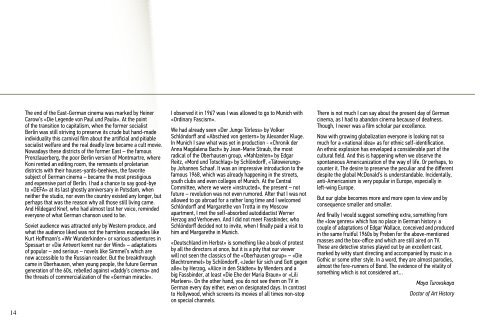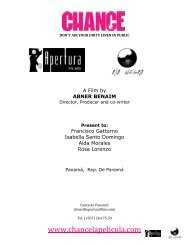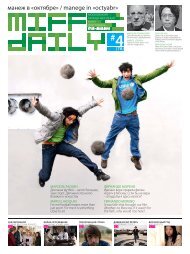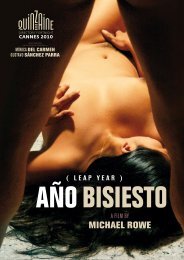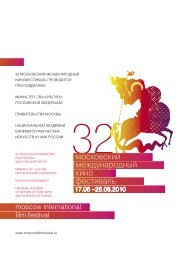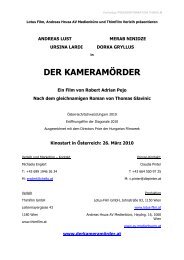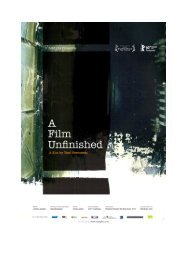Немецкое киНо. от десятилетия к десятилетию 10 DecaDes of ...
Немецкое киНо. от десятилетия к десятилетию 10 DecaDes of ...
Немецкое киНо. от десятилетия к десятилетию 10 DecaDes of ...
Create successful ePaper yourself
Turn your PDF publications into a flip-book with our unique Google optimized e-Paper software.
ПрограммаProgramThe end <strong>of</strong> the East-German cinema was marked by HeinerCarow’s «Die Legende von Paul und Paula». At the point<strong>of</strong> the transition to capitalism, when the former socialistBerlin was still striving to preserve its crude but hand-madeindividuality this carnival film about the artificial and pitiablesocialist welfare and the real deadly love became a cult movie.Nowadays these districts <strong>of</strong> the former East – the famousPrenzlauerberg, the poor Berlin version <strong>of</strong> Montmartre, whereKoni rented an editing room, the remnants <strong>of</strong> proletariandistricts with their houses-yards-beehives, the favoritesubject <strong>of</strong> German cinema – became the most prestigiousand expensive part <strong>of</strong> Berlin. I had a chance to say good-byeto «DEFA» at its last ghostly anniversary in Potsdam, whenneither the studio, nor even the country existed any longer, butperhaps that was the reason why all those still living came.And Hildegard Knef, who had almost lost her voice, remindedeveryone <strong>of</strong> what German chanson used to be.Soviet audience was attracted only by Western produce, andwhat the audience liked was not the harmless escapades likeKurt H<strong>of</strong>fmann’s «Wir Wunderkinder» or various adventures inSpessart or «Die Antwort kennt nur der Wind» – adaptations<strong>of</strong> popular – and serious – novels like Simmel’s which arenow accessible to the Russian reader. But the breakthroughcame in Oberhausen, when young people, the future Germangeneration <strong>of</strong> the 60s, rebelled against «daddy’s cinema» andthe threats <strong>of</strong> commercialization <strong>of</strong> the «German miracle».I observed it in 1967 was I was allowed to go to Munich with«Ordinary Fascism».We had already seen «Der Junge Törless» by VolkerSchlöndorff and «Abschied von gestern» by Alexander Kluge.In Munich I saw what was yet in production - «Chronik derAnna Magdalena Bach» by Jean-Marie Straub, the mostradical <strong>of</strong> the Oberhausen group, «Mahlzeiten» by EdgarReitz, «Mord und Totschlag» by Schlöndorff, «Tätowierung»by Johannes Schaaf. It was an impressive introduction to thefamous 1968, which was already happening in the streets,youth clubs and even colleges <strong>of</strong> Munich. At the CentralCommittee, where we were «instructed», the present – notfuture – revolution was not even rumored. After that I was notallowed to go abroad for a rather long time and I welcomedSchlöndorff and Margarethe von Trotta in my Moscowapartment, I met the self-absorbed autodidactist WernerHerzog and Verhoeven. And I did not meet Fassbinder, whoSchlöndorff decided not to invite, when I finally paid a visit tohim and Margarethe in Munich.«Deutschland im Herbst» is something like a book <strong>of</strong> protestby all the directors at once, but it is a pity that our viewerwill not seen the classics <strong>of</strong> the «Oberhausen group» – «DieBlechtrommel» by Schlöndorff, «Jeder für sich und Gott gegenalle« by Herzog, «Alice in den Städten» by Wenders and abig Fassbinder, at least «Die Ehe der Maria Braun» or «LiliMarleen». On the other hand, you do not see them on TV inGerman every day either, even on designated days. In contrastto Hollywood, which screens its movies <strong>of</strong> all times non-stopon special channels.There is not much I can say about the present day <strong>of</strong> Germancinema, as I had to abandon cinema because <strong>of</strong> deafness.Though, I never was a film scholar par excellence.Now with growing globalization everyone is looking not somuch for a «national idea» as for ethnic self-identification.An ethnic explosion has enveloped a considerable part <strong>of</strong> thecultural field. And this is happening when we observe thespontaneous Americanization <strong>of</strong> the way <strong>of</strong> life. Or perhaps, tocounter it. The desire to preserve the peculiar and the differentdespite the global McDonald’s is understandable. Incidentally,anti-Americanism is very popular in Europe, especially inleft-wing Europe.But our globe becomes more and more open to view and byconsequence smaller and smaller.And finally I would suggest something extra, something fromthe «low genres» which has no place in German history: acouple <strong>of</strong> adaptations <strong>of</strong> Edgar Wallace, conceived and producedin the same fruitful 1960s by Preben for the above-mentionedmasses and the box-<strong>of</strong>fice and which are still aired on TV.These are detective stories played out by an excellent cast,marked by witty stunt directing and accompanied by music in aGothic or some other style. In a word, they are almost parodies,almost the fore-runners <strong>of</strong> Bond. The evidence <strong>of</strong> the vitality <strong>of</strong>something which is not considered art…Maya TurovskayaDoctor <strong>of</strong> Art History14 15


